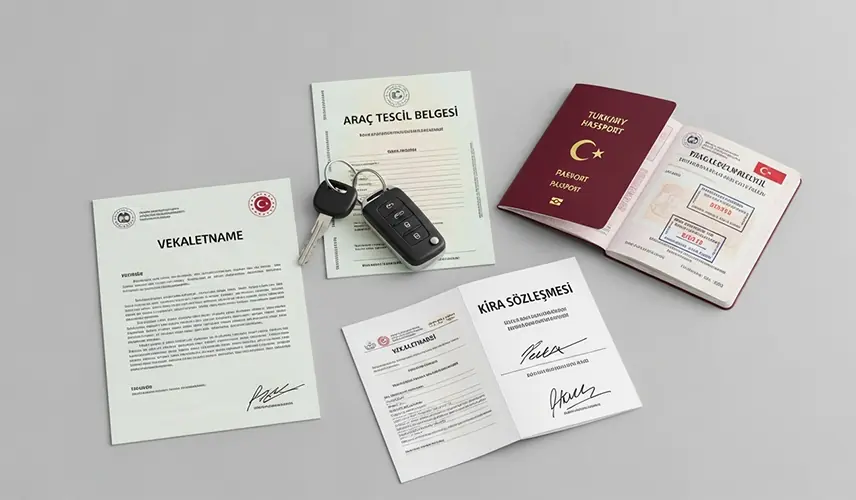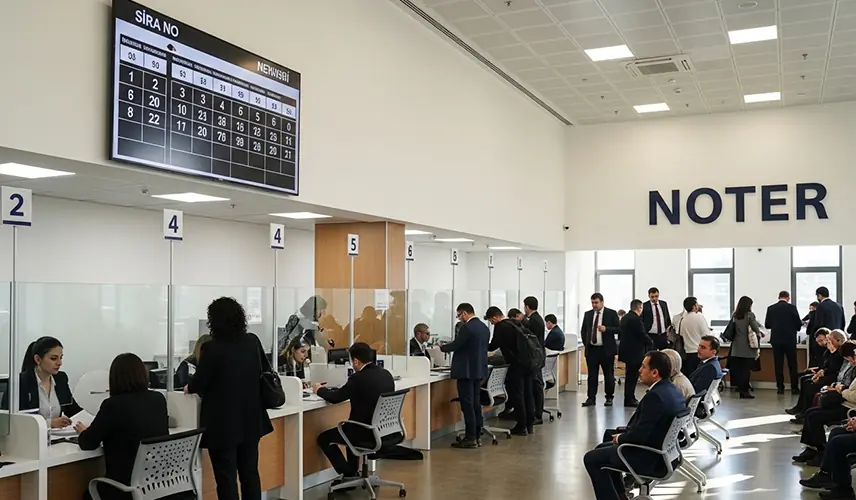What is a Noter in Turkey and Why is it Important?
Notary Public offices, or Noter in Turkey, are institutions that go beyond a simple signature verification office. They are considered a fundamental pillar of the country's legal and administrative system, responsible for ensuring legal security and preventing disputes. A correct understanding of the status and function of these offices is an undeniable necessity for anyone intending to live, invest, or conduct formal business in Turkey. This comprehensive guide will explain what is a Noter, its critical functions, updated costs, and essential procedures for foreigners.
Notary Public offices:
The Noter in Turkey is a public official with specific powers and a unique legal status, appointed by the Turkish government to grant legal validity to documents and transactions of real and legal persons. These offices operate under the Turkish Notary Law (Law No. 1512), and their employees, while working independently as a liberal profession, are considered state employees fulfilling a public duty.
This dual nature is a key feature of the Turkish Noter system. On one hand, as government officials, they must adhere to uniform laws and tariffs across the country, which creates consistency and reliability in the system. On the other hand, as independent professionals, they bear full responsibility for their actions, strengthening trust in their services.
Therefore, the Noter's role is not limited to merely certifying a signature. In many cases, the Noter is responsible for drafting, reviewing, and verifying the content of the document itself to ensure it is legally valid, transparent, and undeniable. This in-depth function turns the Noter into an active agent in creating robust legal documents.
The Validity of Noterized Documents: The Key to Formality in Turkish Administrations
The most crucial function of Noter offices is to confer official validity upon documents. When a document is approved and sealed by a Noter in Turkey, all government offices, official institutions, and the Turkish judicial system are obliged to accept it without needing to re-examine its authenticity. This process grants the document definitive legal status and power.
This legal validity has significant practical consequences. For example, a regular rental agreement signed between an owner and a tenant is a private agreement. However, once this same contract is drafted and approved in a Noter office, it becomes an official document that is an essential and irreplaceable requirement for the Immigration Administration when applying for residence and Turkish citizenship.
This example clearly shows how Noter offices create a bridge between personal agreements and governmental legal requirements, directly impacting vital personal matters (YMYL topics) such as residence status and financial stability. In essence, the fee paid to the Noter is not merely an administrative cost; it's an investment in legal security and the reduction of future risks. By guaranteeing the transparency and legality of transactions from the outset, these offices play the role of a "preventive justice" mechanism; that is, they prevent future disputes and legal claims through precise and unambiguous documentation.
Comprehensive Services of Noter Offices in Turkey
The scope of services offered by Noter offices in Turkey is very broad, covering almost all important aspects of people's civil, commercial, and personal lives. These offices are in a way a "central hub for life events," playing a role in all important stages of people's lives, from birth (certifying documents) and marriage (certifying contracts) to buying and selling property and vehicles, starting a business (commercial contracts), and even death (drafting wills). For a foreigner, learning how to work with the Noter system means learning one of Turkey's most fundamental administrative mechanisms, which will be the key to successfully completing dozens of other essential tasks.

1. Noter Services for Real Estate (Lease Agreements and Preliminary Contracts)
Although the final transfer of the title deed (Tapu) takes place in the Land Registry and Cadastre Directorate (Tapu Dairesi), many preliminary stages and related documents are formalized in Noter offices.
Rental Contracts (Kira Sözleşmesi): Drafting and verification of residential and commercial rental contracts. For foreign nationals intending to apply for or renew their residence permit in Turkey, providing a notarized rental contract is a key requirement.
Promise to Sell Contract (Gayrimenkul Satış Vaadi Sözleşmesi): Drafting and verification of preliminary property sale contracts. This document assures the buyer that the seller is committed to transferring the property in the future and is legally enforceable.
Power of Attorney for Purchase and Sale (Satış Vekaleti): Drafting of Powers of Attorney that allow another person to conduct the affairs related to property purchase or sale on behalf of the owner.
2. Personal and Family Matters (Power of Attorney, Wills, etc.)
Power of Attorney (Vekaletname): One of the most frequently used Noter services is the drafting of general and special Powers of Attorney. This document allows one person (the agent/attorney) to perform specific legal, financial, or administrative actions on behalf of another person (the principal). Precise definition of the scope of authority in the Power of Attorney is extremely important to prevent potential misuse.
Will (Vasiyetname): Drafting and official registration of a will to determine how assets will be divided after death.
Marriage and Birth Documents: Verification of official translations of marriage and birth certificates issued outside of Turkey for use within the country.
Custody Documents: Verification of documents related to child custody.
3. Noter Services for Commercial Matters and Company Registration
For entrepreneurs and investors, the Noter is a vital step in the process of starting and managing a business.
Signature and Company Seal Verification: Authentication and verification of the specimen signatures of directors and the company's official seal.
Commercial Contracts: Registration and verification of partnership agreements, commercial agreements, and other legal company documents.
Undertakings: Drafting and verification of various financial and legal undertakings (taahhütnameler).
4. Verification of Immigration Documents and Official Translations
This section is one of the main points of contact for immigrants with Noter offices. Virtually no foreign document has legal validity in Turkey without Noter verification.
Official Translation Verification: The Noter verifies translations performed by sworn translators for documents such as passports, identity cards, driver's licenses, academic degrees, and transcripts. Without the Noter's seal, these translations are merely a text without legal value.
Invitation Letters: Verification of invitation letters sent for tourist visa applications for friends or family.
5. Buying and Selling Vehicles at the Noter
In Turkey, unlike many countries where vehicle transfer is handled by a separate organization, this duty is entirely the responsibility of Noter offices. All legal procedures for the sale, transfer of ownership, and change of vehicle license plates are carried out at Noter offices, centralizing and standardizing the process.
The table below provides a quick guide to some common Noter services and their requirements.
| Service (Hizmet) | Common Use (Kullanım Amacı) | Key Requirements (Gerekenler) | Critical Note (Önemli Not) |
|---|---|---|---|
| General Power of Attorney (Genel Vekaletname) | Appointing an attorney or representative to manage legal/financial affairs | Original passport + certified translation, Tax ID number, 2 passport photos, presence of the principal | Must be drafted carefully to limit authority. It is revocable. |
| Rental Contract Approval (Kira Sözleşmesi Onayı) | Submission to the Immigration Administration for residence application/renewal | Original rental contract, tenant's passport, owner's ID card (residence permit or Kimlik) | The contract format must comply with the Immigration Administration standards. |
| Vehicle Purchase and Sale (Araç Alım Satım) | Legal transfer of vehicle ownership | Buyer's and seller's ID cards, vehicle license (Ruhsat), valid inspection certificate | Fees are calculated based on the vehicle price, and the presence of both parties is mandatory. |
| Passport Translation Approval (Pasaport Tercüme Onayı) | For opening a bank account, company registration, obtaining a Tax ID number | Original passport, translation done by a sworn translator | The translation must be accurate and without any discrepancy with the original document. |
How Much are Noter Fees in Turkey? 2025 Updates
Understanding the fee structure is a crucial YMYL aspect. Due to information asymmetry, where the user is not aware of the exact cost until the final calculation, it's essential to understand the factors at play. Noter in Turkey fees are subject to annual government-mandated increases.
Noter Fee Calculation Factors:
Fees are not fixed and are calculated based on:
-
Type of Document: Each document (PoA, contract, translation) has a base tariff.
-
Number of Pages: The fee is calculated per page.
-
Word Count: In some cases, the number of words affects the cost.
-
Number of Copies: Additional copies increase the fee.
-
Value of the Transaction: For property or vehicle sales, the value may factor into the calculation.
2025 Cost Estimates:
While exact official 2025 tariffs are determined annually by the Union of Notaries of Turkey, recent trends indicate a significant increase each year. Based on historical trends and current estimates, you should budget for the following (Note: These are estimates for planning purposes and can vary widely):
-
Notarization per page: An average page fee (for translation verification) is currently estimated to be in the range of 1,200 to 2,000 Turkish Lira or more, depending on the complexity and official rates.
-
General Power of Attorney (PoA): Given the complexity and length, a standard PoA can cost anywhere from 2,500 to 5,000 Turkish Lira or more.
-
Vehicle Sale: This is a comprehensive service with significant costs, often exceeding 4,000 Turkish Lira and varying with the vehicle's price.
Ancillary Costs to Budget For:
- Sworn Translator Fee: This is a separate fee paid directly to the translation office, calculated per page or per 1000 characters.
-
Interpreter Fee: If you do not speak Turkish, the mandatory presence of an interpreter during the signing of important documents (like a PoA) will incur an additional fee.
Best Strategy: Always ask for an estimated cost from the Noter clerk or translator at the earliest opportunity to prevent surprises.
Steps for Noterizing Documents in Turkey (Step-by-Step Guide)
The process of notarizing documents in Turkey is a clear and standardized administrative procedure that can be likened to a production line. This process is not flexible, and success in it, rather than creativity, requires careful preparation and strict adherence to the defined steps. Understanding this sequential and non-negotiable procedure is the key to a smooth and stress-free experience.

Step 1: Selecting a Sworn Translator (Yeminli Tercüman)
The first and most important step is the translation of the documents. Noter offices only accept translations performed by a "Sworn Translator" (Yeminli Tercüman). A sworn translator is an individual who has been certified by the Noter system itself, and their seal and signature are valid for Noter offices.
Finding a Translator: Sworn translator offices are usually located near Noter branches.
Translation Requirements: The translation must be accurate, complete, and stamped with the translator's seal. Any minor discrepancy can lead to the document being rejected by the Noter.
Step 2: Visiting the Noter Office and Submitting Documents
After preparing the translation, you must go to a Noter office with all the required documents.
Required Documents:
- The original document you intend to have the translation verified for (such as a passport, driver's license, etc.).
- The official translation sealed by the sworn translator.
- Valid identification (for foreign nationals, the original passport is mandatory).
Internal Office Process:
- Getting a number: Upon entry, take a number from the queuing machine.
- Seeing the clerk: After your number is called, go to the respective counter and hand your documents to the clerk (Katip). The clerk checks the documents for completeness and initial accuracy.
Final Step: Paying the Fee and Receiving the Official Document
After initial verification by the clerk, the process enters the final stage.
Fee Payment: The clerk calculates the final amount and gives you a slip. Payment must be made at a separate counter called "Vezne" (the cashier). Explaining this two-stage internal system is very important, as many people expect to pay the fee to the same clerk who took the documents, while document review and fee collection are done by two separate sections.
Final Signature and Seal: After payment and presenting the receipt to the first clerk, the final document is signed and sealed by the Noter (the chief notary public) and gains legal validity. The official document will then be handed over to you.
How to Find the Nearest Noter Office? (Address and Working Hours)
On the one hand, the Turkish administrative system has a strict and traditional structure, evident in specified working hours and mandatory lunch breaks, but on the other hand, it has responded to the needs of a modern and dynamic society by creating mechanisms like the "Noter on Duty." This duality indicates a pragmatic approach that users should be aware of.

1. Methods for Finding Noter Office Addresses:
Finding a Noter office in Turkey is not difficult, as many of them exist in all cities and districts.
- Using Online Maps: The simplest and quickest way is to search for the word "Noter" on applications like Google Maps. These applications display the nearest offices along with addresses and contact information.
- Official Website: The Union of Notaries of Turkey (Türkiye Noterler Birliği) has an official website at www.tnb.org.tr through which you can find a list of all Noter offices in a specific city.
- Important Location Tip: A practical and very important tip is that many Noter offices are located on the upper floors of administrative buildings, and their entrances are not directly on the street. Therefore, when visiting, attention must be paid to the guide signs at the building entrances.
2. Noter Office Working Hours and Best Time to Visit
- Working Hours: Noter offices typically operate from Monday to Friday, from 9:00 AM to 5:00 PM or 5:30 PM.
- Lunch Break: Almost all offices close for a one-hour lunch break, usually between 12:30 PM and 1:30 PM. Visiting during this time frame will be futile.
- Best Time to Visit: To avoid long queues, it is recommended to visit Noter offices early in the morning (at the start of business hours) or immediately after the lunch break ends.
3. Noter on Duty (Nöbetçi Noter): The Immediate Solution for Weekends
To meet the urgent needs of citizens, the Turkish government has implemented a system called "Noter on Duty" (Nöbetçi Noter). These offices are open on Saturdays, Sundays, and public holidays.
- Noter on Duty Hours: The working hours of these offices are more limited, typically from 10:00 AM to 4:00 PM.
- How to Find: The list of Noters on Duty changes weekly. To find the active office in your area, you can visit the website of the relevant city's Notary Chamber (e.g., Istanbul Noter Odası) or contact their information hotline. This system is a valuable "lifeline" for urgent matters that cannot be postponed until working days.
Key Tips for Visiting the Noter
Success in the Turkish Noter system depends more than anything on understanding one fundamental principle: the system is built on an official "chain of trust." The sworn translator is trusted by the Noter; the Noter is trusted by the government; and the government (Immigration Administration, Land Registry) trusts the Noter's seal without question. Any attempt to break this chain, for example, by using an unofficial translator, will lead to the failure of the entire process. The user's role is not to find shortcuts but to interact correctly with the first link in this official chain of trust.

1. Importance of Simultaneous Interpreter for Non-Turkish Speakers
If you are not fully proficient in Turkish, a written translation of documents is not enough. By law, you cannot commit to a document whose content you do not understand. The Noter is legally obliged to ensure your full comprehension of the content of the document you are signing (especially important documents like a Power of Attorney). Therefore, in such cases, the presence of a sworn interpreter alongside you during the signing of the document will be mandatory. The interpreter will verbally explain all clauses of the document to you, and this fact will also be recorded in the document.
2. Common Mistakes in Noter Procedures and How to Avoid Them
- Missing Documents: Visiting without the original passport, the original required document, or passport photos (if necessary). Solution: Before leaving home, prepare a checklist of all required documents and review it.
- Using an Unofficial Translator: Entrusting the translation to friends or non-certified translation offices. This will lead to immediate rejection of the document and a waste of time and money. Solution: Always ensure your translator is a certified Yeminli Tercüman.
- Not Understanding the Contents of the Power of Attorney: Signing a general Power of Attorney when a Power of Attorney with specific, limited authorities is required. This mistake can lead to granting very broad and unintended powers to the agent. Solution: Insist that the interpreter explains all clauses of the Power of Attorney to you word-for-word, and only sign it after fully understanding it.
3. Checking the Official TNB Website
The Turkish Noter system is also evolving with technology. The Union of Notaries of Turkey (TNB) is developing digital platforms known as "e-Noter." Although not all services are yet offered online, some processes are being digitized. It is recommended to check the official TNB website before making an in-person visit to see if it's possible to complete a portion of your work online. In the future, this could lead to significant savings in time and cost.
Conclusion: The Noter, Your Guarantor of Legal Security in Turkey
Noter in Turkey offices play a role far beyond simple verification; they are the custodians of legal security, facilitators of formal transactions, and one of the main pillars of the country's administrative system. Even with the wave of digitalization and the latest Turkey Notary News simplifying some processes, such as the digital maintenance of accounting books (e-Defter) and certain signature declarations for commercial companies, the Noter's role remains indispensable for key legal acts like issuing Powers of Attorney and authenticating vital foreign documents. For anyone dealing with this system, especially foreign nationals, understanding its nature, processes, and updated requirements is not an option but a necessity. By being fully prepared, strictly adhering to legal procedures, and respecting the official chain of trust, administrative processes in Turkey can be completed smoothly, efficiently, and successfully, protecting your rights and interests within the framework of Turkish law in the best possible way.

 USD
USD
 TRY
TRY
 EUR
EUR
 IRR
IRR
 RUB
RUB

Comments